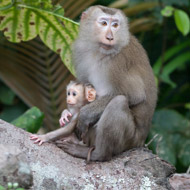
Deforestation causing monkeys to move closer to humans
There is a growing threat to humans from a form of malaria found in monkeys, according to research presented at the American Society of Tropical Medicine and Hygiene (ASTMH) Annual Meeting.
During his presentation, Balbir Singh, director of the Malaria Research Center, said that an analysis of malaria patients hospitalised in Malaysian Borneo in 2013 revealed that 68 per cent had been sickened by Plasmodium knowlesi.
The knowlesi parasite is increasingly associated with malaria deaths and is three times more frequent as a cause of severe malaria in Borneo than the more common P. falciparum parasite, which is currently considered the world's most deadly form of the disease.
It used to be found only in the long-tailed and pig-tailed macaques found in the tropical rainforests of Malaysia and South East Asia. However, due to deforestation, the monkeys have been squeezed out of their original habitats and have ended up living closer to people. The mosquitoes transmit the parasite and are now biting and infecting humans.
Balbir Singh said: "This is a form of malaria that was once rarely seen in people, but today, in some remote areas of the country, all of the indigenous malaria cases we are seeing are caused by the P. knowlesi parasite.
"If the number of cases continue to increase, human-to-human transmission by mosquitoes becomes possible. In fact, this may already have happened, which would allow P. knowlesi malaria to spread more easily throughout Southeast Asia."
Because the mosquito that carried the parasite feeds mainly outdoors and at night, the researchers say that the knowlesi parasite presents a new challenge for the broader effort to control and eliminate malaria in south east Asia - a fight that has been focussed on using bed nets and indoor spraying to prevent malaria infections.
"Controlling a zoonotic, meaning an animal-to-human infection, carried by outdoor feeding mosquitoes is almost impossible with currently used methods," Singh said.
Alan J. Magill, president of the ASTMH, added: "These intriguing results are yet another example of the complexity and diversity of the interaction between man, his activities, parasites, and mosquitoes.
"P. knowlesi is now a significant cause of human malaria in Malaysian Borneo that must be addressed across multiple levels: research, development, implementation, funding and evidence-based policies."
Image (C) JJ Harrison.



 RCVS Knowledge has welcomed Professor Peter Cockcroft as editor-in-chief for Veterinary Evidence.
RCVS Knowledge has welcomed Professor Peter Cockcroft as editor-in-chief for Veterinary Evidence.